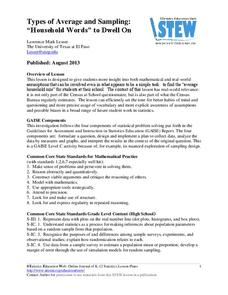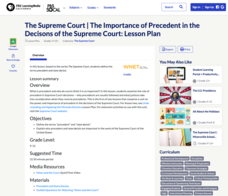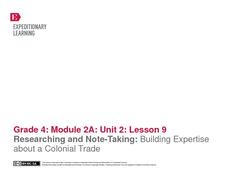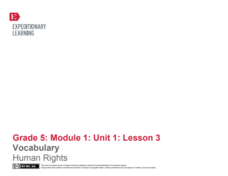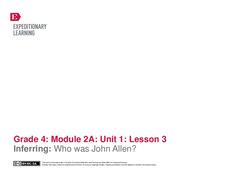Statistics Education Web
Types of Average Sampling: "Household Words" to Dwell On
Show your classes how different means can represent the same data. Individuals collect household size data and calculate the mean. Pupils learn how handling of the data influences the value of the mean.
Curated OER
Earthquakes: Kindergarten Lesson Plans and Activities
Beginning with a pre-lab, kindergarteners trace the letters in the word earthquake and discuss what happens in an earthquake. The lab portion allows young scientists realize that earthquakes trigger shaking of different intensities...
EngageNY
Selecting a Sample
So what exactly is a random sample? The 15th part in a series of 25 introduces the class to the idea of selecting samples. The teacher leads a discussion about the idea of convenient samples and random samples. Pupils use a random...
Roald Dahl
Matilda - Arithmetic
Mr. Wormwood, one of the characters in Roald Dahl's Matilda, is not the most trustworthy of characters. Have student groups take on the roles of car salespeople and play a game to see who can make the most profit by selling refurbished...
National Institute on Drug Abuse
The Brain's Response to Drugs
Marijuana affects the brain differently than inhalants, which have a different effect than opioids. Elementary and middle school classes read about these drugs as well as nicotine, methamphetamine, hallucinogens, and steroids before...
US Institute of Peace
Becoming a Peacebuilder
"Be the change you wish to see in the world!" The 15th and final lesson in a peacebuilding series uses this quote from Gandhi to prepare pupils for their own action projects. Individuals research a global issue, then brainstorm a method...
PBS
The Supreme Court: The Importance of Precedent in the Decisions of the Supreme Court
People often hear the words precedent and Supreme Court together, but why? A resource on the Supreme Court includes a variety of discussion questions, handouts that guide young historians, a video about Nixon and the court system, and...
Texas Education Agency (TEA)
Managers and Cultural Diversity
Let's get down to business. Pupils read a variety of business scenarios and identify appropriate managerial styles for each conflict. Additionally, scholars create a cultural diversity word collage.
Newseum
Battle for the Bill of Rights: Ultimate Survivor Amendment Game
To understand the importance of the wording of the articles of the First Amendment (freedom of religion, freedom of speech and the press, and freedom to assembly and petition), teams argue before a jury for draft amendments of one...
K20 LEARN
Growing Themes
The theme of a work is not a single word! Rather it is a statement that reflects what a writer believes or wants readers to understand about a topic or subject. Here's a short, but powerful lesson that utilizes passages from The...
Curated OER
A Holiday Calendar in MS Publisher for Elementary School
Students create a holiday calendar using ms word. In this technology lesson, students create their own calendar while learning basic Publisher skills. Students use clipart, explore how to change fonts, and how to use templates.
Curated OER
The Colonization of the United States
Bring the Age of Exploration into the 21st century with this ancestry activity! Learners get a chance to explore the complex genealogy of the Spanish settlers through watching two video clips (approximately five minutes each) featuring...
EngageNY
Researching and Note-Taking: Building Expertise about a Colonial Trade
Building on the previous activity in this unit on colonial trade, the ninth activity has young experts continuing their research and writing summaries of the information they find. To begin, children participate in guided practice where...
K20 LEARN
Watch Your Tone: Tone Analysis Through Music And Nonfiction
Identifying the tone of a piece of writing or the author's attitude toward the subject matter can be difficult for learners. Simplify the process with a lesson that begins with skits, moves to songs and their lyrics, and then to passages...
Kelly's Kindergarten
April Daily Resources
Spring has sprung in your classroom! An entire month of activities relating to spring prompts learners to color, draw, write, and work on phonics.
EngageNY
Vocabulary: Human Rights
Your class continues to explore the history of the Universal Declaration of Human Rights. In addition to learning about the background of this text, learners work on the skill of identifying and understanding key academic vocabulary....
EngageNY
Inferring: Who was John Allen?
Help your learners work with difficult or archaic words. A continuation of lesson two of this module, the plan here focuses on deciphering the Inventory of John Allen, in particular the unfamiliar words that make up much of the list. Add...
Curated OER
Running Out of Time: Vocabulary Strategies
Review concepts and terms after reading Running Out of Time. Learners each come up with a few terms that they think are important and then participate in a list-group-label exercise, paying close attention to the two main years featured...
Museum of the Moving Image
Understanding the Language of Political Ads
The verbal techniques and emotional appeals contained in the language used in political ads plays a vital role in creating the impact of the ad. As class members continue their study of Presidential campaign commercials from 1952–2012,...
Virginia Department of Education
Modeling Division of Fractions
Provide a meaningful context for learning about the division of fractions with this upper-elementary math lesson. Presented with a simple, real-world problem, young mathematicians work in small groups to develop visual models that help...
Ware County Schools
Simple Directions
When teaching someone how to do something, it's important to give clear directions. Your youngsters can practice their skills by completing these worksheets meant to help learners describe the steps in a process. It's not just any...
EngageNY
Grade 9 ELA Module 3, Unit 3, Lesson 4
The fourth activity in a unit on crafting a research paper focuses on cohesion within and between paragraphs. Class members examine models that lack cohesion and ones that are cohesive and logically developed before using what they have...
Little Stones
How Can Poetry Make People Think and Care?
Can beautiful words change the world? Literary scholars discover how to paint their visions of change using poetry in a series of three workshops. Each independent topic gives participants a chance to examine their feelings about...
EngageNY
Resource Materials and Gathering Information: Reading Another “Choice” Text from the Research Folder
Look it up. Scholars use a dictionary and thesaurus to verify the meaning of the research vocabulary words they defined in the previous activity. They then use sticky notes to write a synonym for each word. Finally, individuals choose a...
Other popular searches
- Sight Words
- Root Words
- Compound Words
- Possessives
- Multiple Meaning Words
- Possessive Nouns Worksheets
- Descriptive Words
- Transition Words
- Possessive Nouns
- Rhyming Words
- Square Roots
- Vocabulary Words


